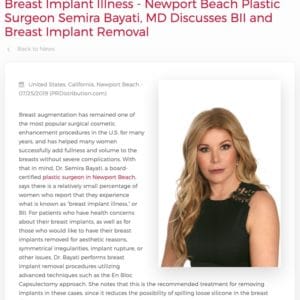
Newport Beach, CA– Breast augmentation has remained one of the most popular surgical cosmetic enhancement procedures in the U.S. for many years, and has helped many women successfully add fullness and volume to the breasts without severe complications. With that in mind, Dr. Semira Bayati, a board-certified plastic surgeon in Newport Beach, says there is a relatively small percentage of women who report that they experience what is known as “breast implant illness,” or BII. For patients who have health concerns about their breast implants, as well as for those who would like to have their breast implants removed for aesthetic reasons, symmetrical irregularities, implant rupture, or other issues, Dr. Bayati performs breast implant removal procedures utilizing advanced techniques such as the En Bloc Capsulectomy approach. She notes that this is the recommended treatment for removing implants in these cases, since it reduces the possibility of spilling loose silicone in the breast tissue.
Dr. Bayati says breast implant illness is a term that often describes a group of symptoms including aching joints and muscles, rashes, cognitive issues, fatigue, hair loss, and a dry sensation that occurs all over the body. In some cases where women have claimed they suffer from breast implant illness, the patients noted that their symptoms went away once the implants were removed. Dr. Bayati says, while the condition is still being debated in the scientific community as to whether the reported symptoms are directly related to the breast implants themselves, the concerns among women who feel they are suffering from BII should be explored. She notes that, at her practice, breast implant removal via En Bloc Capsulectomy may be recommended, depending on the unique factors of each case and the patient’s wishes.
En Bloc Capsulectomy is the name of a breast implant removal technique that removes both the breast implant and its surrounding capsule at the same time. Dr. Bayati says this “total capsulectomy” technique may be the best approach in certain cases of BII, as well as for some patients who have capsular contracture (the development of excess scar tissue around the implant that can give it a hardened feel), and for those who have a ruptured implant. She notes that an En Bloc Capsulectomy can remove as much of the scar tissue and capsule as possible, while simultaneously removing the breast implant.
Dr. Bayati says breast implant removal procedures are generally performed on an outpatient basis and can often utilize the same incisions used for the initial implant placement, which can avoid additional scarring. She reveals that some patients choose to have a revision breast augmentation at the time of implant removal in order to replace the old implants with new ones, while others choose to have their breast implants removed altogether. In the latter case, Dr. Bayati says it is not uncommon for women to opt for a breast lift after the implants have been removed, which helps address inelastic, sagging breast tissue and can produce a firmer breast appearance.
In addition to BII, recent news reports about a very rare cancer called Breast Implant-Associated Anaplastic Large Cell Lymphoma (BIA-ALCL) and its possible links to certain types of breast implants have caused some individuals concern about their implants and possible general health effects. Dr. Bayati says that, whether a patient has concerns about breast implant illness, BIA-ALCL, or implant rupture, or if they would simply like to go back to their original appearance prior to the initial breast augmentation, she will address each patient’s needs and answer all of their questions about breast implant removal procedures and the options that may help them address their concerns. She also notes that, while many women who have breast implants experience no lingering effects that create serious complications or illnesses, it is always important for patients to attend their regular check-up appointments, obtain the advised number of mammograms, and routinely perform self-breast exams so that any irregularities or issues can be found as early as possible. Breast implants are devices that require surveillance and replacement. Dr. Bayati says, for silicone implants, the recommendation includes an MRI scan 3 years after insertion and every 2 years thereafter, and replacement every 10-15 years.
About Semira Bayati, MD, FACS
Dr. Semira Bayati is a Diplomate of the American Board of Plastic Surgery and a member of the American Society of Plastic Surgeons, the American Society for Aesthetic Plastic Surgery, and the American Medical Association. A board-certified plastic surgeon and a Fellow of the American College of Surgeons, Dr. Bayati has been recognized multiple times as a Physician of Excellence by the Orange County Medical Association and has been named a “Top Doctor” in Orange Coast magazine. In addition to breast implant removal, breast augmentation, and other breast surgery options, Dr. Bayati offers a comprehensive array of plastic surgery and non-surgical cosmetic enhancement procedures for the face and body at her private practice in Newport Beach. She has also given numerous research presentations at plastic surgery conferences and symposia throughout the world, and has contributed to a range of published articles in plastic and reconstructive surgery journals. Dr. Bayati is available for interview upon request.
For more information about Dr. Bayati’s practice, visit drbayati.com or facebook.com/drbayati.
Contact:
S. Bayati, MD, FACS
20311 SW Birch Street
Suite 200
Newport Beach, CA 92660
(949) 756-0400
Rosemont Media
(858) 200-0044
www.rosemontmedia.com


